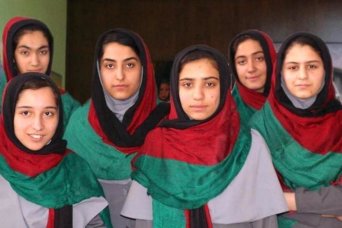- About
- Topics
- Story
- In-Depth
- Picks
- Opinion
- News
- Donate
- Signup for our newsletterOur Editors' Best Picks.Send
Read, Debate: Engage.
| located: | Afghanistan, Estonia, Pakistan |
|---|---|
| editor: | Shadi Khan Saif |
History is a testimony to the fact that some of the brightest minds in our world have been ignored in their home countries because their gender, religion or background might not fit with the status quo.
Unfortunately, the all-female robotics team from Afghanistan – a group of young and promising school girls from western Herat province – seems to fall into this very category. When the world media praised the girls for winning the Entrepreneurial Challenge at Robotex – regarded as “Europe’s biggest robotics festival”, which took place in the Estonian capital of Tallinn from November 24 to 26 – there was little mention of it across the girls’ home country, where leaders and civilians seem overwhelmed by the ragging security, political and economic crises.
One doesn’t need to be too cynical to deplore this dilemma, it can hurt and irritate any sensible soul to see the way the valour of these young women is unsung. I remember spotting desperation on the face alongside a ray of hope in the eyes of one of the group’s youngest members, Robaba Noori, during the summer. After an initial visa rejection, the group was finally allowed to fly to the US to represent their war-torn country amongst 157 countries in a science fair at the Constitution Hall in Washington. I had a brief chat with Noori in Kabul’s Hamid Karzai International Airport before boarding her flight.
One of her teammates had lost her father to a bombing in Herat earlier this year. But, the praises for their achievements seem confined from the limited official quarters, namely from the President, the Chief Executive Officer and some embassies in the west. Broadly speaking, the general sentiments towards such outstanding individuals are neither of apathy nor suspicion.
Malala Yosufzai from neighbouring Pakistan is another example of this mind-set and attitude towards individuals, particularly women and girls who challenge the statues que in terms of restrictions imposed on them for centuries. The Nobel laureate known for her strong voice for female education worldwide is still seen with suspicion in her home country.
This all comes as a Human Rights Watch (HRW) report, “I won’t be a doctor, and one day you’ll be sick: girls’ access to education in Afghanistan”, last month underlined that as security in the country worsens and international donors disengage from Afghanistan, progress made toward getting girls into school has stalled.
